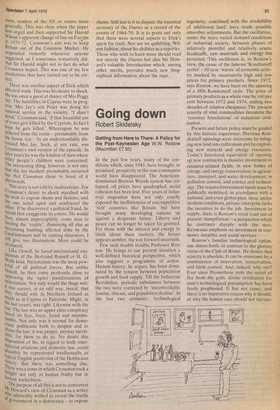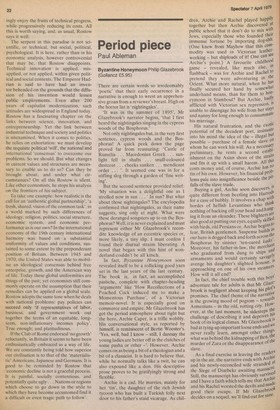Going down
Robert Skidelsky
Getting from Here to There: A Policy for the Post-Keynesian Age W.W. Rostow (Macmillan 27.95) In the past few years, many of the conditions which, since 1945, have brought, or promised, prosperity to the non-communist world have disappeared. The Americandominated Bretton Woods system has collapsed, oil prices have quadrupled, social cohesion has been lost. Five years of industrial stagnation have not only cruelly exposed the inefficiencies of uncompetitive 'rich' countries like Britain, but have brought many developing nations up against a desperate future. Liberty and peace can no longer be taken for granted. For those with the interest and energy to think about these matters, the future appears sombre, the way forward uncertain.
Few such doubts trouble Professor Rostow. He brings to our present situation a well-defined historical perspective, which also suggests a programme of action. Human history, he argues, has been dominated by the tension between population growth and food supply. Till the Industrial Revolution, periodic imbalances between the two were corrected by 'uncontrollable famine, disease, and population decline'. In the last two centuries, 'technological ingenuity, combined with the availability of additional land' have made possible smoother adjustments. But the oscillation, under the more varied demand conditions of industrial society, between phases of relatively plentiful and relatively scarce foodstuffs, raw materials and energy has persisted.'This oscillation is, in Rostow's view, the cause of the famous `Kondratieff cycles' — 50 year 'waves' of economic activity marked by successively high and low prices for primary products. Since 1972, says Rostow, we have been on the upswing of a fifth Kondratieff cycle. The price of primary products as a whole rose by 160 per cent between 1972 and 1974, ending two decades of relative cheapness. The present scarcity of vital commodities threatens the 'resource foundations' of industrial civilisation.
Present and future policy must be guided by this historic experience. Previous Kondratieff upswings were overcome by bringing new land into cultivation and by exploiting new mineral and energy resources. Today's functional equivalent of opening up new continents is massive investment in resource-related fields: in new forms of energy, and energy conservation; in agriculture. transport. and water development; in pollution control, and science and technology. The required investment funds must by publically mobilised, in accordance with a national, and even global plan, since, under modern conditions, private enterprise lacks the incentive to do the job. Investment in supply, then, is Rostow's royal road out of present `slumpflation' — a perspective which he contrasts sharply with the neoKeynesian emphasis on investment in consumer durables and social services.
Rostow's familiar technological optimism shines forth, in contrast to the gloomy vistas of the Club of Rome. He denies that scarcity is absolute. It can be overcome by a combination of innovation, conservation, and birth control. And, indeed, why not? Ever since Prometheus stole the secret of fire from the gods, divine retribution for man's technological presumption has been freely prophesied. It has not come; and there is no imperative reason why it should; or why the human race should not increas ingly enjoy the fruits of technical progress, while progressively reducing its costs. All this is worth saying, and, as usual, Rostow says it well.
The serpent in this paradise is not scientific, or technical, but social, political.
psychological. It is here, rather than in his economic analysis, however controversial that may be, that Rostow disappoints.
Technical innovation is applied, mis applied, or not applied, within given political and social contexts. The Emperor Had rian is said to have had an inven tor beheaded on the grounds that the diffusion of his invention would lessen public employments. Even after 200 years of capitalist modernization, such attitudes are widespread in England today.
Rostow has a fascinating chapter on the links between science, innovation, and entrepreneurship. Yet the link between industrial technique and society and politics is unexamined. When it comes to politics, he relies on exhortation: we must develop the requisite political the national and international 'consensus' to overcome our problems. So we should. But what changes in current values and structures are neces sary to enable us to do so? Can they be brought about, and under what cir cumstances? On all this Rostow is silent. Like other economists, he stops his analysis on the frontiers of his subject.
To take one example: how realistic is the call for an 'authentic global partnership'. 'a fresh, shared, vision of the common task', in a world marked by such differences of ideology, religion. politics, social structure.
economic system, and economic per formance as is our own? In the international economy of the 19th century international harmony was based on a substantial uniformity of values and conditions, sustained to some extent by the preponderant position of Britain. Between 1945 and 1970. the United States was able to mobilise an ideological consensus behind free enterprise, growth, and the American way of life. Today these global uniformities are things of the past; yet economists still commonly operate on the assumption that their remedies can be applied on a global scale. Rostow adopts the same tone when he deals with national problems: pay policies can succeed only If representatives of labor, business, and government work out together the terms of an equitable, longterm, non-inflationary incomes policy'. True enough; and platitudinous.
If the Club of Rome endorsed `no growth' reluctantly, in Britain it seems to have been enthusiastically embraced as a way of life. We are constantly being told how superior our civilisation is to that of the 'materialistic' Americans, Japanese and Germans. It is good to be reminded by Rostow that 'economic decline is not a graceful process. It is painful, socially contentious, and potentially quite ugly. . . Nations or regions which choose to go down in the style to which they have become accustomed find it a difficult or even tragic path to follow'.



































 Previous page
Previous page